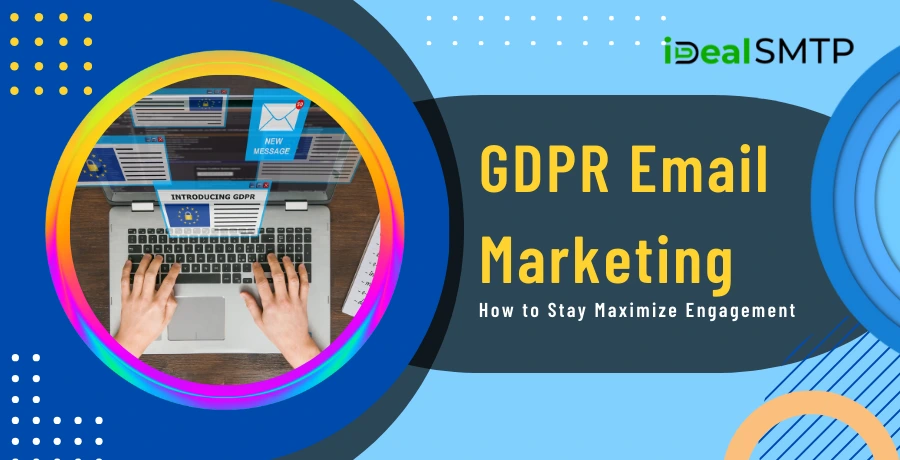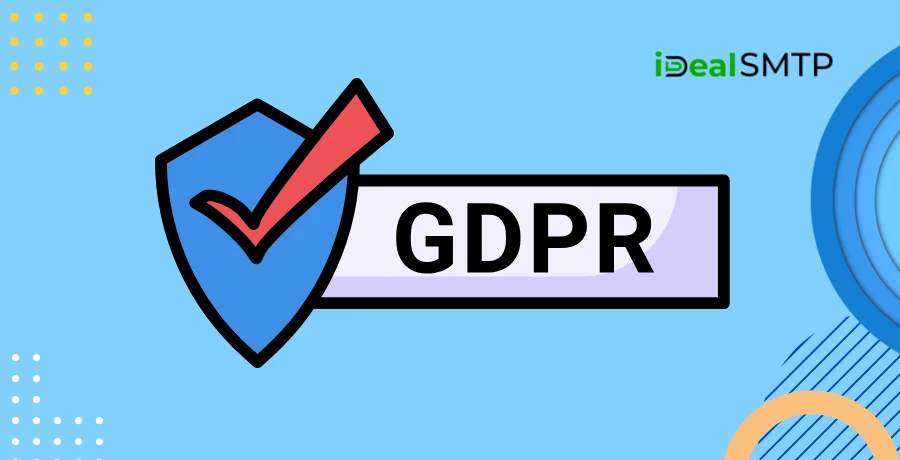Email marketing remains one of the most effective channels for B2B and B2C outreach. However, with the implementation of the General Data Protection Regulation (GDPR), businesses must now navigate stringent data protection rules to ensure compliance. Failure to adhere to GDPR can result in hefty fines, reputational damage, and loss of customer trust.

This blog provides a deep dive into the GDPR email marketing service, outlining best practices for compliance while maintaining an effective email marketing strategy.
Table of Contents
Pricing
| Trail Plan | Standard Plan | Premium Plan | Professional Plan |
| $50 | $145 | $185 | $225 |
| Sending Limit | Sending Limit | Sending Limit | Sending Limit |
| 1000 Emails/Hour | 1500 Emails/Hour | 3000 Emails/Hour | 5000 Emails/Hour |
What is GDPR?
GDPR, or the General Data Protection Regulation, is a European Union (EU) law that came into effect on May 25, 2018. It is designed to protect the personal data and privacy of EU citizens. Any organization that collects, processes, or stores data of EU residents must comply with GDPR, regardless of its location. GDPR imposes strict rules on consent, data access, and security measures, making it crucial for businesses to adopt compliant email marketing strategies.
Key Principles of GDPR for Email Marketing
When it comes to GDPR email marketing, businesses must adhere to several key principles:
- Lawfulness, Fairness, and Transparency – Organizations must collect data legally, inform users how their data will be used, and ensure fairness in data processing.
- Purpose Limitation – Data should only be collected for specific and legitimate purposes.
- Data Minimization – Businesses should only collect necessary information and avoid excessive data gathering.
- Accuracy – Email lists must be kept up to date to ensure that only relevant and active recipients receive emails.
- Storage Limitation – Personal data should not be stored longer than necessary.
- Integrity and Confidentiality – Security measures should be implemented to protect personal data from breaches.
- Accountability – Organizations must be able to demonstrate compliance with GDPR requirements.
How GDPR Impacts B2B Email Marketing
GDPR B2B email marketing requires businesses to rethink their approach to email campaigns. Unlike B2C marketing, where explicit consent is mandatory, B2B marketers have some flexibility under the concept of “legitimate interest.”
Legitimate Interest in B2B Email Marketing
Legitimate interest allows businesses to send emails to professional email addresses (e.g., [email protected]) without explicit consent, provided:
- The recipient has a relevant professional interest in the content.
- The email content aligns with the recipient’s job role and industry.
- There is an option to opt out of receiving further emails.
While legitimate interest can be used, businesses must document their reasoning for sending emails on this basis.
Explicit Consent for B2B Email Marketing
For emails that do not fall under legitimate interest, businesses must obtain explicit consent. This means:
- Users must actively opt in to receive emails.
- Pre-checked boxes or assumed consent are not valid under GDPR.
- Businesses must provide clear and specific information on how data will be used.
How to Build a GDPR-Compliant Email Marketing Strategy
Building a GDPR-compliant email marketing strategy ensures that your email campaigns align with the European Union’s General Data Protection Regulation (GDPR). Here’s a step-by-step guide to ensure compliance while maintaining high engagement rates.

1. Obtain Proper Consent
To comply with GDPR email regulations, businesses must ensure their email lists consist of contacts who have given explicit permission to receive communications. This can be done through:
- Double Opt-In: After signing up, users receive an email confirmation to verify their subscription.
- Clear Sign-Up Forms: Forms should specify what kind of emails users will receive and how often.
2. Maintain a Transparent Privacy Policy
Your privacy policy should be easily accessible and clearly outlined:
- How data is collected.
- The purpose of data collection.
- Data retention periods.
- How users can withdraw consent.
3. Allow Easy Opt-Out Options
GDPR requires that all marketing emails include a simple method for recipients to unsubscribe. Businesses must:
- Include a clear “unsubscribe” link in all emails.
- Honor opt-out requests promptly.
4. Keep Email Lists Clean and Up-to-Date
Regularly update and clean your email marketing service lists to remove inactive subscribers. This practice ensures:
- You only engage with interested recipients.
- Your email deliverability rates improve.
5. Use Secure Email Marketing Services
Choosing a GDPR email marketing service is critical. Look for providers that:
- Offer data encryption and security measures.
- Allow users to manage their data preferences.
- They are transparent about their data processing policies.
6. Document Compliance
To demonstrate compliance, maintain records of:
- Consent was obtained for each subscriber.
- Privacy policy updates.
- Proof of legitimate interest justification (if applicable).
The Role of Email Marketing Services in GDPR Compliance
A GDPR email marketing service helps businesses manage data securely and legally. Here are some key features to look for in an email marketing platform:
- Consent Management – The platform should allow businesses to track and store consent records.
- Data Protection Measures – Encryption, firewalls, and data access controls ensure security.
- Unsubscribe & Data Removal Options – Users should have the ability to manage their email preferences.
- Audit Logs – A transparent record of data processing activities.
Some popular GDPR email marketing services include:
- iDealSMTP – Provides tools for consent management and GDPR-compliant sign-up forms.
- HubSpot – Offers compliance tools and marketing automation.
- Brevo (formerly Sendinblue) – Features GDPR-ready contact management.
- SMTPget – A secure SMTP service ensuring high deliverability while complying with GDPR.
The Consequences of Non-Compliance
Failing to comply with GDPR can lead to severe penalties. Businesses can face:
- Fines of up to €20 million or 4% of annual global revenue (whichever is higher).
- Loss of customer trust due to data breaches or misuse.
- Legal actions and reputational damage can impact long-term business growth.
Conclusion
GDPR email marketing requires businesses to prioritize data protection and transparency while maintaining effective engagement strategies. By obtaining proper consent, using GDPR email marketing services, and implementing best practices, businesses can successfully navigate GDPR while optimizing their B2B email marketing efforts.
By ensuring compliance, businesses not only avoid penalties but also build trust and long-term relationships with their audience. Implementing GDPR principles into email marketing campaigns is not just a legal necessity but also a step toward ethical and responsible marketing practices.
Final Thoughts
To stay ahead, businesses should regularly review GDPR guidelines, update their data protection policies, and use GDPR-compliant tools. Whether you are a small startup or a large enterprise, following GDPR rules will help you create sustainable and successful email marketing campaigns.
FAQs
Here are the top FAQs on GDPR email marketing:
1. What is GDPR in email marketing?
GDPR is a European law that protects user data and privacy. It affects how you collect and use email addresses for marketing.
2. Does GDPR apply to B2B emails?
Yes, GDPR applies to B2B emails, especially if you’re targeting contacts in the EU.
3. What is “legitimate interest”?
It means sending emails without permission if it’s relevant to the recipient’s job, but you still need to give them an easy way to opt out.
4. Do I need consent for all email marketing?
Not always. For B2C, yes. For B2B, you can use legitimate interest, but you should still explain and document it.
5. Can I use pre-checked boxes for consent?
No. GDPR requires active, clear consent. Pre-checked boxes are not allowed.
6. What is double opt-in?
It’s when someone signs up and confirms their email through a second verification step.
7. Is an unsubscribe link required in emails?
Yes. Every marketing email must have an easy-to-use unsubscribe option.
8. What happens if I don’t follow GDPR?
You could face big fines, lose customer trust, and damage your business reputation.
9. Do I need to update my privacy policy for GDPR?
Yes. It should clearly explain how data is collected, used, and stored.
10. Which email tools are GDPR-compliant?
Tools like iDealSMTP, SMTPget, HubSpot, and Brevo offer GDPR features like consent tracking and secure data handling.







